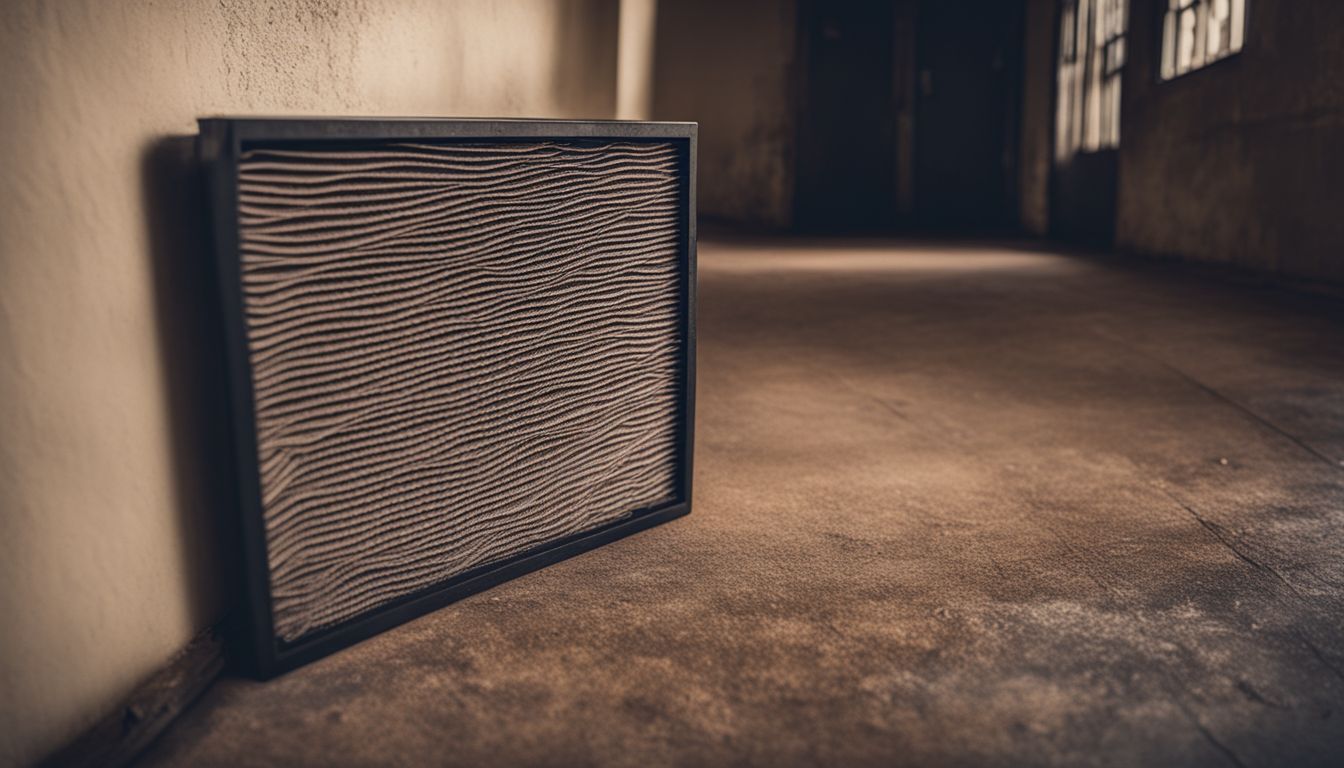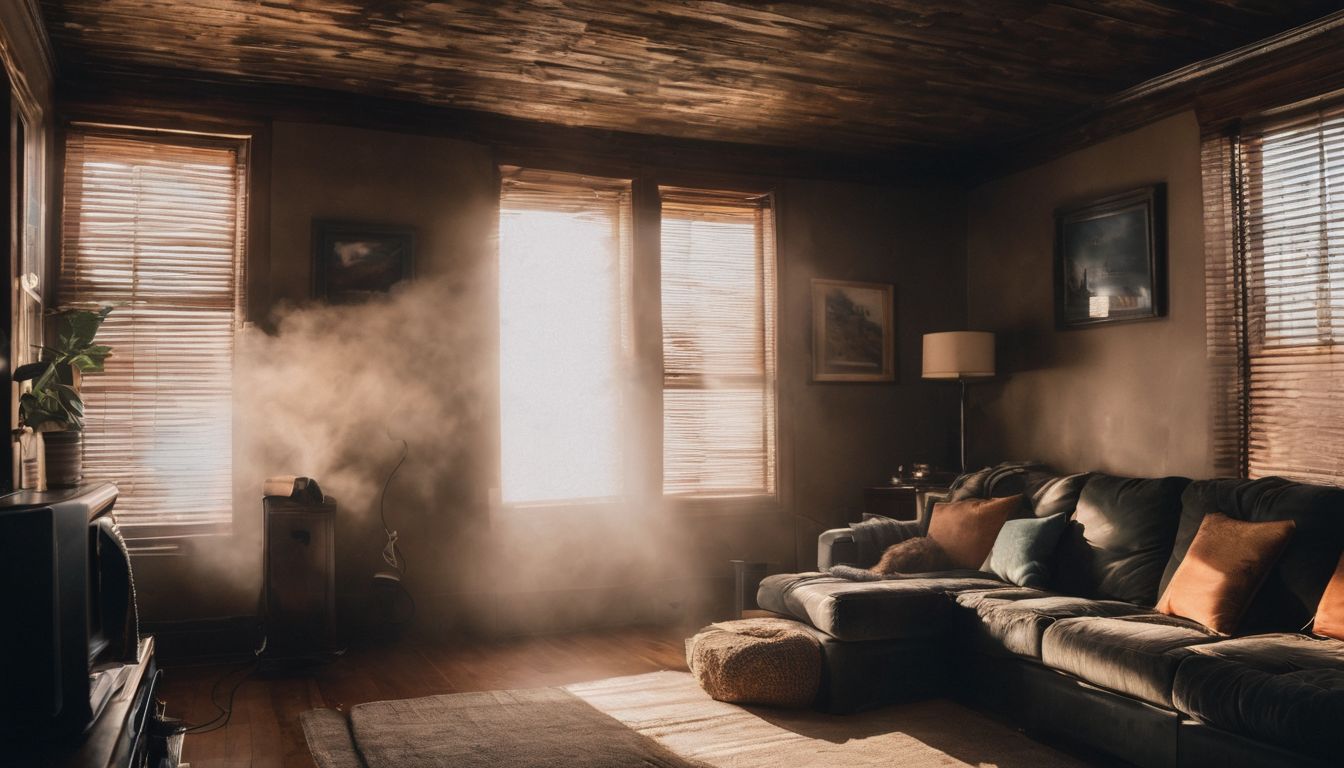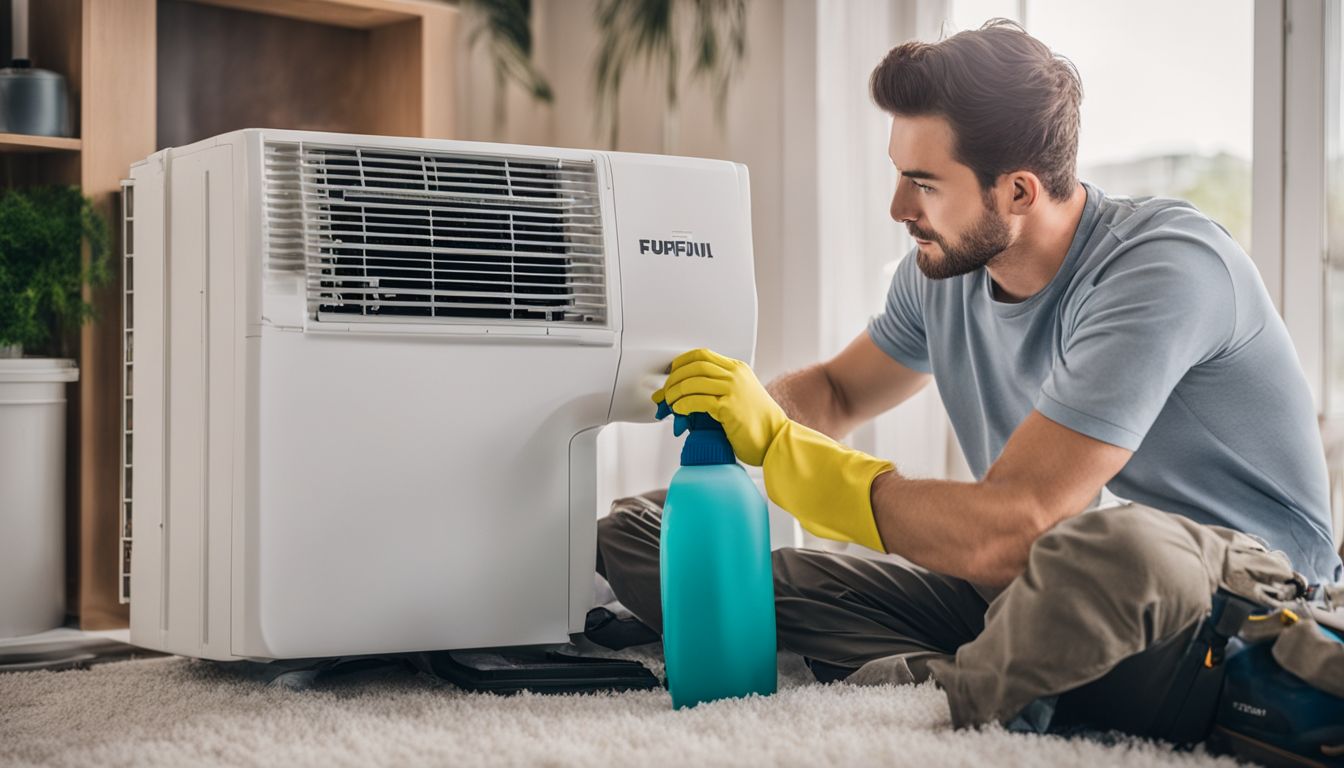Are you noticing that your rooms feel stuffier than usual? A dirty air filter can reduce the efficiency of your heating and cooling systems, leading to a less comfortable home. This post will guide you through easy ways to spot a dirty AC filter so you can take swift action.
Keep reading for some enlightening tips!
Recognising the Signs of a Dirty Aircon Filter
To ensure your air conditioning unit functions optimally, staying vigilant for indications of a soiled filter is paramount. Spotting these signs early can prevent many issues and maintain efficiency and air quality.
Uneven Temperatures in Rooms
If your living room feels like a sauna but the bedroom more like a fridge, it’s worth checking your aircon filter. A dirty or clogged filter can disrupt airflow, causing some areas to overheat while others stay too cool.
This inconsistent temperature distribution not only affects comfort but also suggests that the heating and air conditioning system isn’t running as smoothly as it should be.
Spotting hot or cold spots in different parts of your home can indicate that the air filters need attention. A clean filter ensures that warm or cool air evenly reaches every corner through the ductwork, maintaining a balanced indoor climate.
If rooms have varying temperatures, this signals an airflow problem, usually stemming from blocked filtering systems within your HVAC unit. Keeping those filters free from dirt is key to avoiding these uneven temperatures and sustaining energy efficiency throughout the premises.
Dust Accumulation Near Air Vents
Notice a gathering of dust around your air vents? This could be signalling that your aircon filter needs attention. Filters clogged with dust struggle to trap more particles, allowing them to escape into the room and settle near the vents.
Regularly spotting a dusty area in these zones indicates an overdue filter change.
Your ventilation system relies on clean paths to deliver fresh air efficiently throughout your home. If you see weak airflow coupled with increased dirt deposits, it’s likely that blocked or clogged vents are behind this issue.
Keeping filters free from obstruction ensures optimum performance of your HVAC equipment, maintaining cleaner air and healthier living conditions in your space.
Increased Energy Bills

Your air conditioner might be working overtime due to a dirty filter, and this extra effort translates into higher energy bills. A clogged filter restricts airflow, forcing the HVAC system to expend more energy to cool your home.
This can cause your utility bills to spike as the system struggles to maintain the desired temperature set by your thermostat.
Keep an eye on your monthly utility statement; a sudden increase in cost may signal that it’s time for air filter maintenance. Regularly replacing or cleaning the aircon filter ensures efficient operation and can help control energy consumption and your bills.
Don’t let a dirty filter drain your wallet; take action to sustain both clean air and manageable expenses.
The Effect of a Dirty Aircon Filter on Indoor Air Quality
A filthy aircon filter can severely compromise the sanctity of your indoor environment, acting as a launch pad for allergens and contaminants that taint the air you breathe. It imperils not just comfort but health, too, precipitating a silent assault on air quality that often goes unnoticed until symptoms dictate otherwise.
Aggravation of Allergies
If your allergies seem worse than usual, it might be time to check your aircon filter. A dirty filter is a haven for allergens such as pollen, dust mites, and pet dander. These trapped particles can get recirculated through your home every time the air conditioning kicks in.
This constant cycle of airborne irritants can trigger allergy symptoms and even lead to asthma attacks.
Air purification becomes less effective with a clogged filter, allowing more allergens to linger in your indoor environment. People with sensitive respiratory systems will notice their symptoms flaring up more often, with sneezing, coughing or wheezing being common reactions.
Replacing the air filter regularly helps ensure that the indoor air stays cleaner and healthier for everyone, especially those suffering from allergic reactions or asthma.
Overall Reduction in Indoor Air Quality
Clogged air filters in your home can turn your sanctuary into a hub for air pollutants. Over time, the accumulation of dust, mould, and airborne particles overwhelms the filter’s capacity to trap contaminants.
This results in poor-quality air circulating through your living spaces as these harmful substances bypass clogged filters. The air handler struggles to maintain clean airflow, leading to an environment filled with irritants that can aggravate respiratory conditions.
Air purifiers work less efficiently when paired with a dirty filter, undermining their ability to remove particulates. Evaporator coils and blower fans coated in debris cannot operate at peak performance, reducing indoor air quality.
Ensuring that your AC system’s filter is free of blockages allows it not just to cool hot water or moderate temperatures but also to safeguard healthy living by filtering out potential hazards from the atmosphere within your home.
Consequences of a Dirty Aircon Filter on the HVAC System
A compromised aircon filter can wreak havoc on an HVAC system, leading to several operational issues. From straining mechanical components to triggering frequent maintenance calls, the impact of neglecting this crucial aspect of your air conditioning systems is far from trivial.
Overheating of the HVAC System
Overheating in your HVAC system can directly result from a clogged air filter. The accumulation of dirt and debris prevents proper airflow, forcing the system to work harder than necessary.
This extra effort generates excessive heat, which, if not addressed promptly, may lead to equipment malfunction or even hazardous fires.
Regularly replacing the air filter is crucial for maintaining your air conditioner’s performance and safety. Ignoring this maintenance can cause cold air to get trapped inside the unit, reducing its efficiency and raising the risk of overheating.
Stay vigilant and ensure that your HVAC system operates safely by checking the condition of your filters frequently.
Frequent Requirement for HVAC Repairs
Neglecting to replace a dirty air filter can lead to constant calls for HVAC repairs. An unclean filter forces the system to work harder, increasing wear and tear on its components.
This strain can cause parts like the motor or frozen coil to fail prematurely, resulting in repeated service visits and extra costs.
Careful attention to changing the air filter can save homeowners from frequent malfunctions. Keeping up with this simple maintenance task ensures that your HVAC system runs efficiently, minimising breakdowns and extending its life span.
Regularly assessing your unit’s minimum efficiency reporting value (MERV) will also help maintain optimal performance, avoiding sudden repair needs.
The Consequences of a Clogged Air Filter on Your Aircon
A clogged air filter can spell trouble for your air conditioner, leading to a cascade of issues that could shorten its lifespan. Restricted airflow forces the system to work harder than necessary, causing extra strain and potentially overheating internal components.
This increased demand not only heightens the risk of malfunction but also leads to a chilling problem — frost development on the coils. As frost accumulates, it can create unpleasant noises during operation and impede your unit’s ability to cool effectively.
Ensuring timely replacement of the air filter is critical in preventing damage to your aircon’s intricate mechanisms. Cold air trapped inside due to clogged filters puts undue pressure on the system, increasing wear and tear, which may result in costly repairs or even complete HVAC failure.
Regular maintenance includes checking and changing your HEPA filtration system as needed. This simple step helps maintain optimal function at the air intake vent and preserves your indoor comfort all year round.
Conclusion
In summary, keeping an eye out for the subtle and more evident indicators of a dirty aircon filter is key to maintaining your home’s comfort and health. Act promptly if you notice uneven temperatures, dust by the vents or surging energy bills.
Remember that replacing your air filter regularly goes a long way in upholding your HVAC system’s efficiency and durability. Spotting these signs early can save you from unnecessary expenses and ensure you breathe cleaner air every day.
Make it routine to check and change those filters so your aircon keeps cool without hiccups.
FAQs
1. How do I know if my aircon filter is dirty?
You’ll realise your aircon filter needs replacing when you spot signs like reduced airflow, strange noises, or dust around the vents.
2. Can a dirty filter affect my air conditioning performance?
Yes, when your air con filter gets clogged with dirt, it can stop working efficiently and might cool your rooms less effectively.
3. What should I look for to check if my filter needs cleaning or replacing?
Look for a build-up of dust and debris on the filter itself; this indicates it’s time to clean or replace the aircon filter.
4. Will changing a dirty aircon filter make a difference in my home?
Absolutely! Replacing a dirty aircon filter can improve indoor air quality and help your system run more smoothly and economically.





